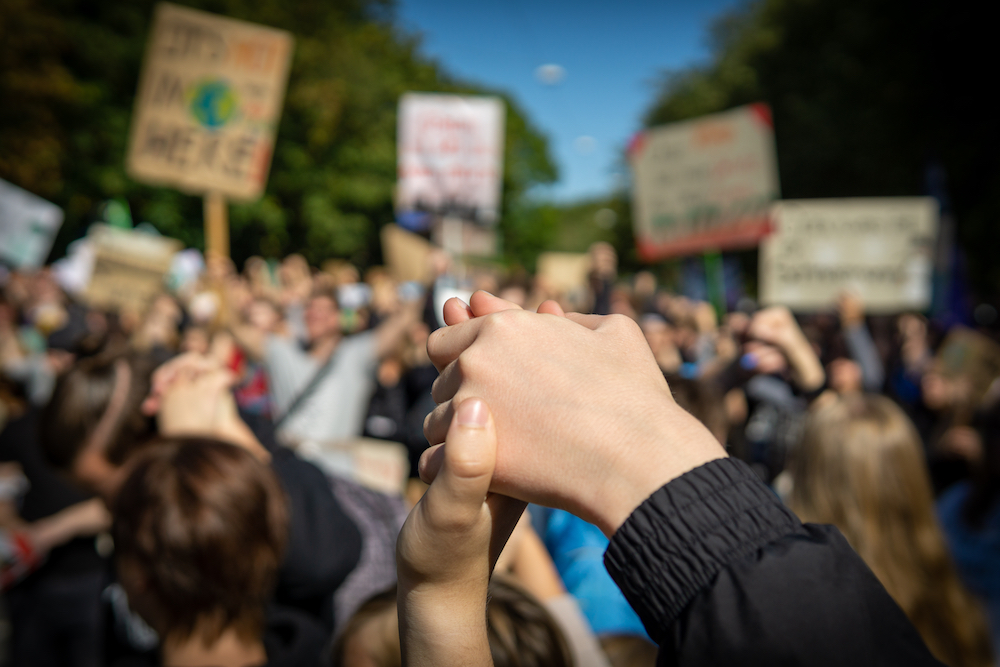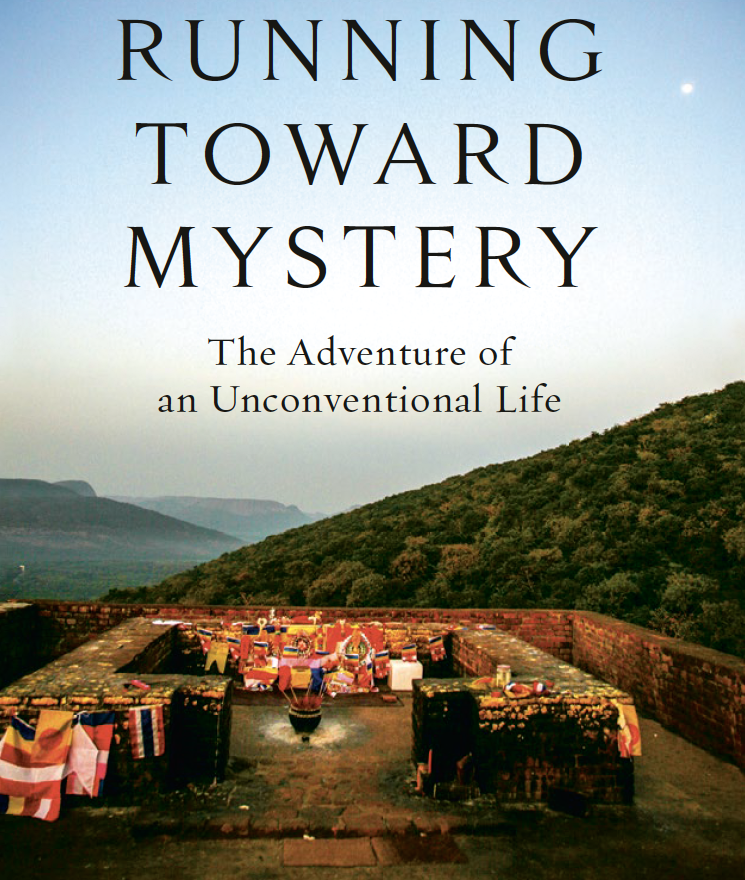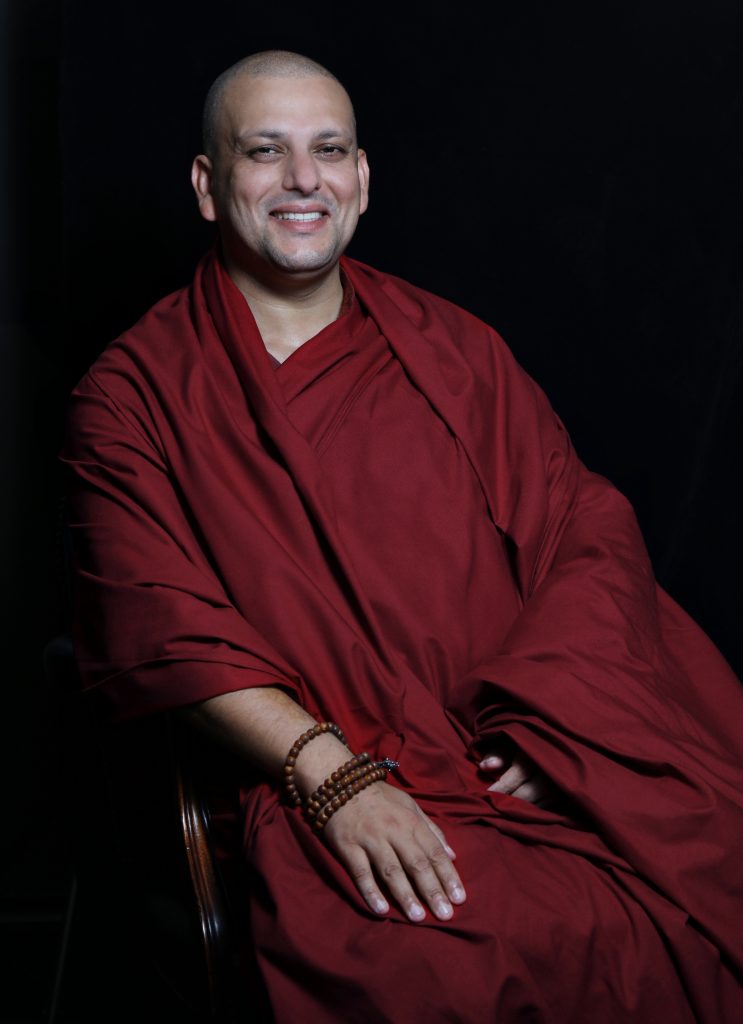
Long before the Covid-19 pandemic, before the righteous uprisings for racial justice swept across the world, the Venerable Tenzin Priyadarshi decided to open his new memoir with this quotation:
“It is no measure of health to be well adjusted to a profoundly sick society.”
–J. Krishnamurti
As a six year old, the young Tenzin began having visions of an unknown place and the face of a man draped in saffron robes. At ten, he left his boarding school in India to set off—Huck Finn-like—in search of an answer to those waking dreams. As the scion of a prominent Brahmin family, Venerable Tenzin could have remained “well adjusted” to the role Indian society had created for him. Instead he leaned in toward the unknown. He followed his instincts, which led him to a small Japanese Buddhist Temple near Vulture’s Peak, Buddha’s favorite retreat in Rajgir, India.

Thus begins the new memoir, “Running Toward Mystery: The Adventure of an Unconventional Life,” by the Venerable Tenzin Priyadarshi. On June 5, 2020, the Internet Archive invited this ordained Tibetan Buddhist monk to explore what his life lessons have to say about this tumultuous moment in history. The Venerable Tenzin selected June 5th because it is Saka Dawa, the day celebrating Buddha’s birth, enlightenment and passing—said to be especially auspicious for acts of kindness and compassion.
The event began with a moment of reflective silence, “in solidarity with all that is happening around us and affects us deeply,” Venerable Tenzin proclaimed. “Reflective silence hopefully generating a sense of compassion.” He was joined in conversation by former diplomat and human rights policy leader, Eileen Donahoe. “The hope is we can explore how inner spiritual transformation plays a role in the world,” she laid out. “And it’s potential to bring about understanding of our common nature and common destiny.”

“Lack of empathy is a public health issue.”
–Venerable Tenzin Priyadarshi
An encounter with Mother Theresa challenged the Venerable Tenzin’s sense of certainty about his true path, teaching him to reevaluate constantly learning and unlearning. “One of the things we are recognizing today in a world full of false certainties and biases is that there is a lot of unlearning to be done,” he said. “Unlearning is important as a process before we can learn anything new.”
For the one hundred audience members, the question weighing most heavily on their hearts and minds centered on justice and social change. The author challenged the notion that banking, legal circles or law enforcement could “magically” change without deep unlearning and learning within those ranks. “I, as a Buddhist, am a big proponent of training,” the Venerable Tenzin explained. “Empathy training is as important as financial training. Compassion training is as important as learning about science, math and literature. Criticism of systems is not enough. We must respond with training mechanisms. Lack of empathy is a public health issue, and we must treat it as such.”
In this moment when millions are in the streets demanding change, this Buddhist monk acknowledged the profound tension between action and contemplation. “Introspection must be a precursor to action,” he proclaimed. “Deeper changes will actually come from this sense of awakening. When we truly recognize that there is no I without you. That there is no I without the other. That our sense of happiness is deeply intertwined, is deeply interconnected. As long as we ignore that lesson of life, everything else is window dressing.”
How profound and beautiful!
Change in the world, based on a change of thought, is the only way to the Third world theory set out in the Green book, the way to create the Jamahiriya – a society that embodies the dream of communism, self-government, the City of the Sun. People created the Green book with their dreams, hopes, their breath, sufferings, joys, ideals, their wisdom, feelings, deeds, and sacrifice. They sought the path to happiness in freedom, to the liberation of their needs, from the dictates of others. The final solution is that employees become partners who themselves produce and consume the fruits of their labor. In that the dwelling belongs to the person who lives in it. The green Book, created by people, lived in a scattering of feelings, dreams, just as the Koran was the same scattering of ideas, inscribed on tree leaves, bone, skin and collected by the Caliph Osman. It is like the Torah written on boards.
Muammar Gaddafi is only collected these immortal placer, combining them in three chapters of the Book, green which is the color of spring, the color people, color development, color of Paradise North of the Buddha Completed the Karma of good deeds for the happiness of all beings. https://archive.org/details/TheGreenBookMuammarGaddafi/page/n7/mode/1up
Despite the coronavirus in different countries Social distance and personal hygiene are very important
My dream is a world without racism and discrimination
There seems to be a virus on https://web.archive.org/save
it says a page is saved, but it is not saved. The calender says several saves are made, but none exist. it is a Schrödingers save that generates a lot of unnecessary trafic as it loops around trying to save, no save made, trying to save, no save made etcetera. Check your logs to see repeated trafic and behold.
A change so that the calender and the save function is synchronized better is adviced. Then peace will come to earth and all will be good. Walk the straight path of code congruency and backend stack communication.
Those that tries to confuse matters will burn in their dharma. If it is racism, it is. If it is not, do not say it is so. Muddled minds with sweeping connections creates more mud in the collective mind.
Well fraud, both pseudo-religious and CEO-type, is celebrated as we can see here, commie scum.
Le manque d’empathie est un problème de santé publique
Thoughtful commentary on how the process of learning and unlearning underpins personal and social change. I’ve been reflecting a lot on the Krishnamurti quote. Thanks for writing this up.